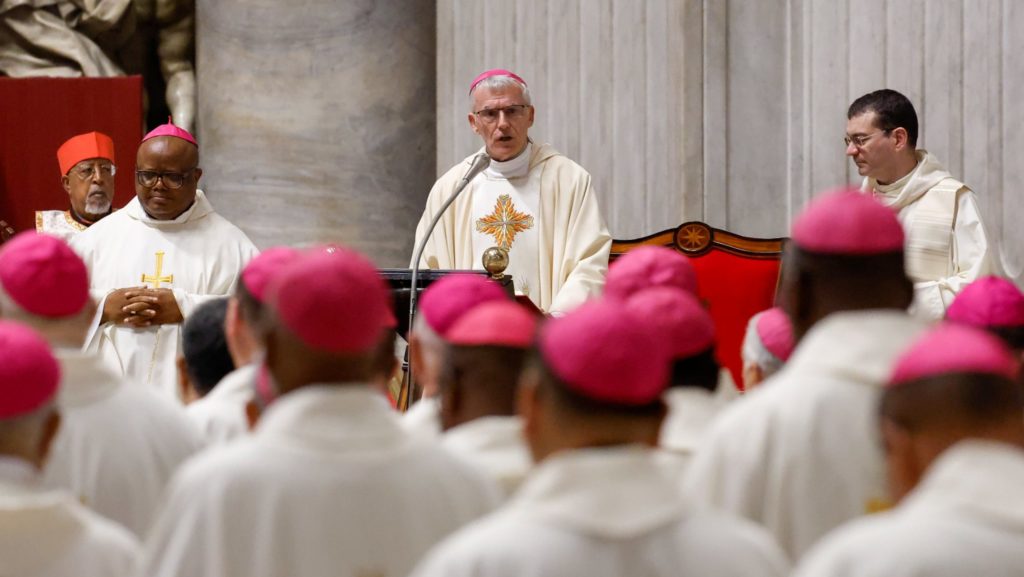As the Synod on Synodality began at the Vatican on Monday, one archbishop said it was Divine Providence it was the Feast of Saint Jerome, a “passionate and difficult man.”
The saint, who died in 420, is best known for translating the Bible into Latin. However, he also had numerous writings on theological issues, and often very stern in his views.
The final Synod on Synodality meeting comes after three years of discussion, debate and even arguments. This meeting involves 368 participants from around the world.
Archbishop Timothy John Costelloe of Perth in Australia said Jerome was “someone who did not find it easy to tolerate what he saw as the shortcomings of others.”
“At the same time, he was someone who could recognise the faults and failings in his own approach to people and who was tormented by the realisation that his fiery approach to others sometimes caused great offence and suffering. He would, perhaps, have been a difficult character to manage if he were a member of a Synod which calls us to deep and respectful listening to each other,” he told Synod participants.
“Among the many things for which he is remembered, however, perhaps his famous saying, that ‘ignorance of the Scriptures is ignorance of Christ,’ is the precious gift he offers us as we enter into all that lies ahead over the next three or four weeks. We cannot afford to be ignorant of Christ, or forgetful of him, as we seek to discern together just what it is that God is asking of the Church at this time,” the archbishop continued.
The Australian archbishop said the journey the Church has taken so far “has led us to a deeper understanding of the meaning of synodality.”
“Now, at this stage of the journey, we are being asked to reflect not so much on what synodality is but rather on how we are to live it at every level of the life of the Church: As individual Christians, certainly, but always as people who are called together, in communities small and big, in order to be living signs and instruments – living sacraments – of communion with God and unity among all people,” Costelloe said.
Mother Maria Ignazia Angelini also spoke about Jerome at the Synod opening, saying he was a “rough and choleric man, with strong passions, who easily quarrelled in his closest relationships, but who was also a careful scrutiniser of sacred Scripture.”
“Today the Gospel speaks: It tells us of the conclusion of a stage of Jesus’ itinerary, towards the beginning of the decisive stage. And we, we are entering a concluding stage – so to speak! – of the synodal journey,” she said.
“A mysterious conclusion that opens up the horizon in a disconcerting way, while the previous stage seems to be closing in on a shadow of failure: In fact, while everyone was admiring him, Jesus had just announced for the second time the approach of the ‘handing over’ of the Son of Man into the hands of men,” Angelini continued.
“And here, right here, Jesus opens up the horizon, rudely bringing the disciples’ awkward dialogismos out into the open and enlightening them in their foolishness, through the simple gesture of bringing close, and establishing a small child beside him. Re-founding of the apostolic college. Living symbol of the disciple, also offered to us. Here, today. The least made living symbol,” she said.
In his opening address, Cardinal Mario Grech said the image of Moses removing his sandals in the presence of the Lord is an image of a “stripping away” that Synod participants are also called to do.
“We strip ourselves of the ‘clothing’ of approaches and patterns that perhaps had meaning yesterday, but today have become a burden for the mission and jeopardize the credibility of the Church,” he explained. “We must be willing to strip ourselves, since listening is a radical action of stripping ourselves before the other and before God,” he said.
Grech said although Synod participants come “from various local Churches, all with their own riches, all with their own challenges, all striving to renew themselves and to find new ways and new language to speak of Jesus to the men and women of today, in these days we are ‘sitting together’ to preserve the Church’s goods through an undivided inheritance to be shared with everyone, no one excluded.”

